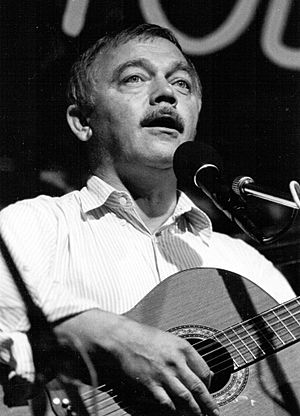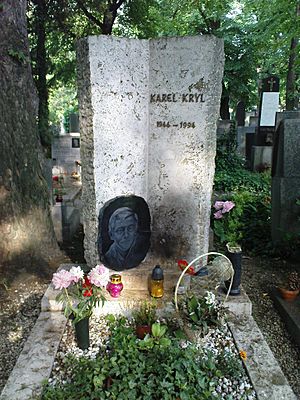Karel Kryl facts for kids
Quick facts for kids
Karel Kryl
|
|
|---|---|
 |
|
| Background information | |
| Born | 12 April 1944 Kroměříž |
| Died | 3 March 1994 (aged 49) Munich, Germany |
| Genres | folk, Protest song |
| Occupations | poet, singer-songwriter, musician, graphic artist |
| Instruments | Guitar |
| Years active | 1968–1994 |
| Labels | Supraphon, Primaphon, Caston, Bonton, And the End Records |
Karel Kryl (born April 12, 1944 – died March 3, 1994) was a famous Czechoslovak poet, singer, and songwriter. He wrote many popular protest songs. In his songs, he spoke out against the unfairness and problems of the Communist government in his home country. Later, he also criticized the new government after communism ended.
Kryl's songs had very clever and poetic words. They often used metaphors, which are like comparisons, and mentioned historical events. He played a simple acoustic guitar, which made his powerful lyrics stand out even more. People sometimes compared him to a young Bob Dylan. This was because his songs had deep meanings, he played a single guitar, and he was very popular.
Karel Kryl lived in exile for twenty years, meaning he had to leave his country. He was happy when communism fell. But soon, he became critical of the new government and its leaders, including Václav Havel. He especially disagreed with those who caused Czechoslovakia to split in 1992.
Contents
Karel Kryl's Life Story
Karel Kryl was born on April 12, 1944, in Kroměříž. At that time, his home was under Nazi rule. His family later moved to Nový Jičín. The Kryls owned a printing business, but the government took it from them after the communists took power in 1948.
Kryl wanted to be a potter. He studied ceramics at a special school in Bechyně and finished in 1962.
Early Music and Protest
In 1968, Kryl moved to Prague. He worked at Czechoslovak Television. In his free time, he performed his folk songs in small clubs. His songs were about love and also made fun of things.
On August 21, 1968, armies from the Warsaw Pact invaded Czechoslovakia. They wanted to stop the "Prague Spring" reform movement. Kryl quickly released his first album. The main song, Bratříčku zavírej vrátka (meaning Keep the Gate Closed, Little Brother), was written right after the invasion. It showed his feelings about the unfair government. The album came out in early 1969. It was soon banned and removed from stores. But people still found ways to listen to his songs, and they became very popular.
Life in Exile
In 1969, Kryl left Czechoslovakia to go to a music festival in West Germany. He knew he would be put in prison if he went back home. So, he decided to ask for political asylum and stay abroad.
His second album, Rakovina (meaning "Cancer"), was also banned in Czechoslovakia. But copies were secretly brought into the country and shared widely. The songs on this album talked about how the country was suffering after the Prague Spring. They also mentioned Jan Palach, a student who set himself on fire to protest the invasion. Kryl's songs also spoke about the police stopping peaceful protests.
In 1973, Kryl got another degree in Germany. He then studied art history and journalism at the Ludwig Maximilian University of Munich. For most of his time away from home, Kryl worked for Radio Free Europe. He released many albums during this period. Even though his albums were banned in Czechoslovakia, his songs became very important. Listening to his music or singing his songs was a way for people to protest secretly. Kryl also went on tours in Scandinavia, North America, and Australia. He wrote songs not only in Czech but also in Polish and German.
Return and Later Life
In November 1989, during the Velvet Revolution, Karel Kryl returned to Czechoslovakia for his mother's funeral. He was very excited that the communist rule had ended. But he soon became disappointed with how the country was changing. He continued to write protest songs, like Demokracie ("Democracy"). These songs criticized politicians and others who he felt were failing the country. He especially criticized those who used to be communists but then suddenly claimed to be "democrats." Kryl also spoke out against those who tried to trick people with nationalist ideas and lies about the economy.
Because he found the situation in his country difficult, he decided to go back to Germany. On March 3, 1994, just a month before his 50th birthday, Karel Kryl died of a heart attack in a hospital in Munich.
Awards and Recognition
Karel Kryl received several awards for his work:
- 1989 – The Jan Zahradníček award for Czech Poetry.
- 1994 – A silver medal from Charles University for helping the nation's spirit and morale.
- 1995 – The František Kriegl award.
- 1995 – The Czech Grammy.
- 1995 – The Medal of Merit (Second Class) from President Václav Havel.
Karel Kryl's Music
Karel Kryl released only one album in Czechoslovakia called Bratříčku, zavírej vrátka. But he released many more albums while he was in exile. A well-known example is Tekuté písky.
Here are some of his albums:
- Bratříčku, zavírej vrátka (1969)
- Rakovina (1969)
- Maškary (1970)
- Carmina Resurrectionis (1974)
- Karavana mraků (1979)
- Plaváček (1983)
- Ocelárna (1984)
- Dopisy (1988)
- Tekuté písky (1990)
- Dvě půle lunety aneb rebelant o lásce (1992)
- Monology (1992)
- To nejlepší 1 (1993)
- Děkuji (1995)
- Jedůfky (1996)
- To nejlepší 2 (1998)
See Also
 In Spanish: Karel Kryl para niños
In Spanish: Karel Kryl para niños
 | Chris Smalls |
 | Fred Hampton |
 | Ralph Abernathy |


